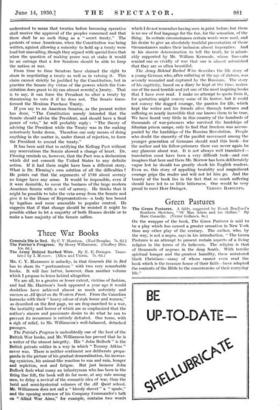Three War Books
MR. C. Y. HARRISON is unlucky, in that Generals Die in Bed has to share its " portmanteau " with two very remarkable books. It will fare better, however, than another volume which I propose to leave behind altogether.
We are all, to a greater or lesser extent, victims of fashion, and had Mr. Harrison's book appeared a year ago it would doubtless have achieved almost as much notoriety and success as All Quiet on the Western Front. From the Canadian barracks with their " heavy odour of stale booze and women," as described on the first page, we are frog-marched to a war, the bestiality and horror of which are so emphasized that the author's sincere and passionate desire to do what he can to prevent its recurrence is entirely defeated. One turns, with a sigh of relief, to Mr. Williamson's well-balanced, detached passages.
The Patriot's Progress is undoubtedly one of the best of the British War books, and Mr. Williamson has proved that he is a writer of the utmost integrity. His " John Bullock " is the British private soldier in a way in which " Tommy Atkins " never was. There is neither sentiment nor deliberate propa- ganda in the picture of his gradual demoralization, his increas- ing cynicism, his animal-like reaction to sun and rain, hunger and repletion, rest and fatigue. But just because John Bullock feels what many an infantryman who has been in the Bring line felt, the book will do far more, at any rate among men, to delay a revival of the romantic idea of war, than the lurid and semi-hysterical volumes of the All Quiet school.
. Williamson does not call a " bloody shovel " a " spade," and the opening sentence of his Company Commander's talk on " Allied War Aims," for example, contains two words
which I do not remember having seen in print before, but there is no use of foul language for the fun, for the sensation, of the thing. In certain circumstances certain words were used, and his desire to give an absolutely truthful presentation of those circumstances makes their inclusion almost imperative. And in his sincere determination to tell the truth, he is admir- ably supported by Mr. William Kermode, whose lino-cuts remind one so vividly of war that one is almost astonished that they are so often beautiful.
The Army Behind Barbed Wire describes the life story of a young German who, after enlisting at the age of sixteen, was severely wounded and captured by the Russians. The story of his captivity, based on a diary he kept at the time, makes one of the most terrible and yet one of the most inspiring books that I have ever read. I make no attempt to quote from it, for quotation might convey some of its horror, but it could not convey the dogged courage, the passion for life, which kept the writer and his friends alive through tortures and suffering so nearly incredible that one knows them to be true. We have heard very little in this country of the hundreds of thousands of war-prisoners who survived the hardships of Siberian prison camps, only to find that freedom was accom- panied by the hardships of the Russian Revolution. People who doubt the sincerity of the pacifist movement among the younger generation of Germans should read this book—for the author and his fellow-prisoners there can never again be any glamour about war. It is not always well translated— translation must have been a very difficult task—and one imagines that here and there Mr. Morrow has been deliberately vague lest he should too greatly shock his English readers. Even so, this story of appalling brutality and magnificent courage grips the reader and will not let him go. And the beauty of the book lies in the fact that so much suffering should have led to so little bitterness. One would be very


































 Previous page
Previous page